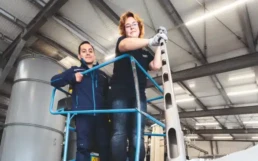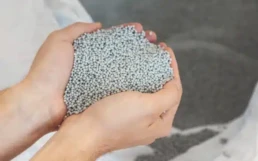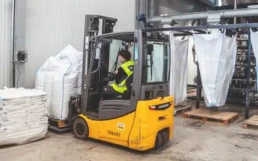PET recycling - things are going well in Liebenau
In Interzero's new PET recycling plant, shredded returnable bottles are converted into food-grade granules for the beverage industry.
Swapping the old for the new: when it comes to recycling PET beverage bottles from the deposit system, this can be taken literally. A look at Interzero's new plant in Liebenau, Lower Saxony, shows what is possible today with state-of-the-art processes. What you don't see here, however, are empty bottles. The material had already gone through several processing steps when it was delivered here. The collected PET bottles have been previously shredded, sorted by material and colour and then cleaned by scalding.

1. Delivery and quality control
The so-called PET flakes arrive at the recycling plant in 1,000 kg big bags. The Interzero team takes a sample from every second bag, examines the material for contaminants and analyses the chemical residues, moisture content and viscosity. The actual processing only begins when quality control gives the green light.
2. Homogenisation
The flakes are first homogenised in mixing silos to absorb fluctuations in the material composition and thus stabilise the downstream processes. The screw conveyor then moves on to a further, even more precise sorting stage. Interzero uses near infrared (NIR) technology for this purpose.
3. near infrared separator
The NIR separator is fully automated and separates impurities and unwanted colours such as green, yellow or dark blue. Only light blue flakes are allowed to remain in the process, as they positively affect the light colour shades required for competitive production grade plastics.
4. Extrusion
Now the actual extrusion phase begins, which converts the pre-treated PET flakes into high-quality granulate for production. For this purpose, the plastic is melted at about 290 °C and fed into another screw conveyor. This viscous mass passes through several filters before finally passing through a perforated panel to be shredded by a granulator. In order to make the granulate suitable for use as a food contact material, a final processing step is necessary, which takes place in a solid state polycondensation (SSP) reactor. The material remains in the reactor for about 10 hours at a temperature of about 180°C in a vacuum/nitrogen atmosphere, which allows the oxygen molecules to escape and prevents undesirable reactions with the material.


5. Return to traffic
The finished granules are put back into big bags and sent for further processing. Interzero customers use food-grade rPET to produce so-called "preforms". These "raw bottles" are produced by injection moulding and look a bit like test tubes: they can be blown into full-size bottles and, once filled, end up back on shop shelves, completing the bottle-to-bottle cycle. The cycle starts again when consumers return their bottles to collect the deposit.

"This plant gives us the opportunity to sell recycled PET pellets for food contact, which we produce in-house. This 'closes the loop' here in Germany, a real sustainability benefit for our customers."
Romed Aspmair
Managing Director, RDB plastics GmbH
Facts and figures
Compact bottle-to-bottle recycling: the plant can recycle a total of 12,000 tonnes per year.
Recycling is carried out under vacuum and part of the process uses a nitrogen atmosphere. This process step ensures that the material stream is free of moisture and undesirable substances that off-gas when the plastic is heated.
A key advantage for beverage customers: the plant is accredited by the European Food Safety Authority (EFSA).